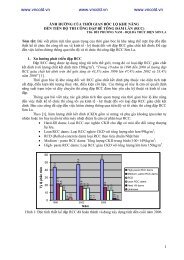Civil Engineering Project Management (4th Edition)
Create successful ePaper yourself
Turn your PDF publications into a flip-book with our unique Google optimized e-Paper software.
success leads to another. By experience and force of his personality he may<br />
pull the job ahead of schedule and complete before the promised time.<br />
14.7 Completion<br />
One of the duties of the engineer is to decide when the works can be considered<br />
complete. Most contracts require that the works are substantially complete<br />
before the engineer can issue his certificate of substantial completion. Unless<br />
the contract has specific requirements to be met, substantial completion does<br />
not require that every last item is finished, but it is generally taken to mean<br />
that most of the works are done and the project can be put to safe and effective<br />
use by the employer. There will no doubt be some items outstanding and<br />
conditions, such as ICE (7th edition), allow for this while requiring that any outstanding<br />
work is completed as soon as practicable during the defects period<br />
or to an agreed timetable. Items left to be finished later would be those which<br />
do not affect operation, such as painting; or may even include minor structures,<br />
such as a gatehouse not essential to use of the works.<br />
A shrewd contractor will be looking to get his certificate of completion as<br />
early as possible and may apply to the engineer as soon as he thinks he has<br />
any chance of it being allowed. Clause 48 of the ICE conditions (7th edition)<br />
allows for such an application which must, however, be accompanied by an<br />
undertaking to finish outstanding work. The engineer must then either issue<br />
a certificate, or state what needs to be done to complete. The resident engineer<br />
must advise the engineer of matters still to be completed and say if he considers<br />
the contractor’s application for completion is too early. Before the engineer<br />
issues his certificate of completion he will need to check with the employer to<br />
ensure that he has staff available to take over completed works.<br />
14.8 Estimating extension of time<br />
Programme and progress charts 175<br />
Failure to complete in time may make the contractor liable to pay liquidated<br />
damages, as specified in the contract, to the employer. Hence at the time a<br />
completion certificate is issued, the engineer must decide whether any extension<br />
of the time for completion is allowable. Extensions of time may have to<br />
be allowed if the contractor is delayed by problems for which the employer is<br />
liable under the contract. These should have been notified as they arose and<br />
considered at the time (see Section 17.10). There may also be sections of the<br />
work which the contract requires to be completed earlier than for the project<br />
as a whole. It is important to note that not all delays will lead to an extension.<br />
Some may not affect the path to completion and others may be matters for<br />
which the contractor is responsible. It is necessary to check with the contract<br />
conditions (such as ICE 7th edition Clause 44) to identify which delays are to<br />
be taken into account, such as ‘exceptional adverse weather conditions’, etc.


















